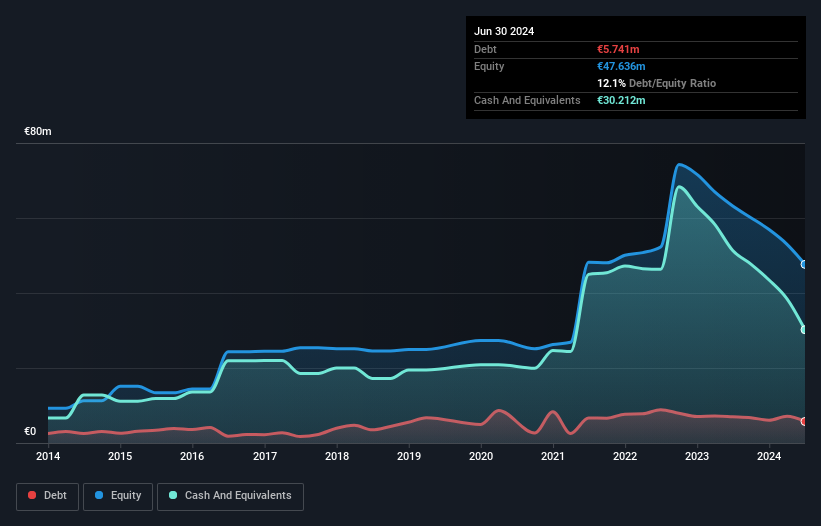Warren Buffett famously said, 'Volatility is far from synonymous with risk.' So it might be obvious that you need to consider debt, when you think about how risky any given stock is, because too much debt can sink a company. Importantly, EDAP TMS S.A. (NASDAQ:EDAP) does carry debt. But is this debt a concern to shareholders?
When Is Debt Dangerous?
Generally speaking, debt only becomes a real problem when a company can't easily pay it off, either by raising capital or with its own cash flow. Part and parcel of capitalism is the process of 'creative destruction' where failed businesses are mercilessly liquidated by their bankers. However, a more frequent (but still costly) occurrence is where a company must issue shares at bargain-basement prices, permanently diluting shareholders, just to shore up its balance sheet. Of course, plenty of companies use debt to fund growth, without any negative consequences. The first step when considering a company's debt levels is to consider its cash and debt together.
See our latest analysis for EDAP TMS
How Much Debt Does EDAP TMS Carry?
You can click the graphic below for the historical numbers, but it shows that EDAP TMS had €5.74m of debt in June 2024, down from €7.01m, one year before. But it also has €30.2m in cash to offset that, meaning it has €24.5m net cash.

How Healthy Is EDAP TMS' Balance Sheet?
We can see from the most recent balance sheet that EDAP TMS had liabilities of €27.4m falling due within a year, and liabilities of €7.09m due beyond that. Offsetting these obligations, it had cash of €30.2m as well as receivables valued at €18.2m due within 12 months. So it actually has €13.9m more liquid assets than total liabilities.
This excess liquidity suggests that EDAP TMS is taking a careful approach to debt. Because it has plenty of assets, it is unlikely to have trouble with its lenders. Succinctly put, EDAP TMS boasts net cash, so it's fair to say it does not have a heavy debt load! When analysing debt levels, the balance sheet is the obvious place to start. But ultimately the future profitability of the business will decide if EDAP TMS can strengthen its balance sheet over time. So if you're focused on the future you can check out this free report showing analyst profit forecasts.
Over 12 months, EDAP TMS reported revenue of €62m, which is a gain of 8.8%, although it did not report any earnings before interest and tax. That rate of growth is a bit slow for our taste, but it takes all types to make a world.
So How Risky Is EDAP TMS?
We have no doubt that loss making companies are, in general, riskier than profitable ones. And we do note that EDAP TMS had an earnings before interest and tax (EBIT) loss, over the last year. Indeed, in that time it burnt through €19m of cash and made a loss of €20m. However, it has net cash of €24.5m, so it has a bit of time before it will need more capital. Even though its balance sheet seems sufficiently liquid, debt always makes us a little nervous if a company doesn't produce free cash flow regularly. There's no doubt that we learn most about debt from the balance sheet. But ultimately, every company can contain risks that exist outside of the balance sheet. Case in point: We've spotted 3 warning signs for EDAP TMS you should be aware of.
If, after all that, you're more interested in a fast growing company with a rock-solid balance sheet, then check out our list of net cash growth stocks without delay.
Valuation is complex, but we're here to simplify it.
Discover if EDAP TMS might be undervalued or overvalued with our detailed analysis, featuring fair value estimates, potential risks, dividends, insider trades, and its financial condition.
Access Free AnalysisHave feedback on this article? Concerned about the content? Get in touch with us directly. Alternatively, email editorial-team (at) simplywallst.com.
This article by Simply Wall St is general in nature. We provide commentary based on historical data and analyst forecasts only using an unbiased methodology and our articles are not intended to be financial advice. It does not constitute a recommendation to buy or sell any stock, and does not take account of your objectives, or your financial situation. We aim to bring you long-term focused analysis driven by fundamental data. Note that our analysis may not factor in the latest price-sensitive company announcements or qualitative material. Simply Wall St has no position in any stocks mentioned.
About NasdaqGM:EDAP
EDAP TMS
Develops, manufactures, promotes, and distributes minimally-invasive medical devices for urology based upon proprietary ultrasound technology in Asia, France, the United States, and internationally.
Slight risk with mediocre balance sheet.
Similar Companies
Market Insights
Community Narratives



